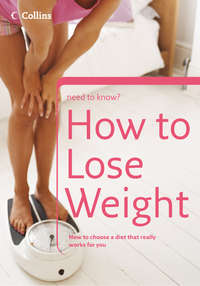
How to Lose Weight
must know
Weight gain is easy
It takes about 3,500 surplus calories to put on 0.45 kg (1 lb) of fat, which sounds like a lot until you consider that eating just 80 calories more than you need each day (that’s only one chocolate digestive) could lead to a weight gain of 3.6 kg (8 lb) in a year!
Facts of life
Can you be overweight and healthy? The answer is yes – and no. Of course your overall health depends on many risk factors, such as your family history, whether you smoke or drink heavily, your fitness level, where you carry your weight and so on. If being overweight is your only risk factor, then you have more chance of remaining in good health than someone who ticks a lot of ‘risk’ boxes. And there will always be overweight people who reach a hale and hearty old age without losing a pound.
Unfortunately, however, statistics show that if you are overweight you are unlikely to be one of those people – they are the exception that proves the rule. Here are five disturbing facts, which come from UK National Health Service-endorsed studies:





must know
Being underweight
Being underweight (BMI of 18.5 or less) is a health hazard, and can lead to loss of fertility in women, lower resistance to infection, osteoporosis and a lack of vital vitamins and minerals. Extreme loss of weight can also indicate eating disorders, such as bulimia or anorexia nervosa, which require careful and specialized treatment.
Why weight is to blame
It is easy to imagine why being overweight can cause certain health problems – breathlessness or pain in weight-bearing joints such as the knees and lower spine. Some medical conditions, however, have a more complex relationship with weight. As we saw earlier, a BMI of between 18.5 and 24.9 is thought to be within the desirable ‘healthy’ range, so, in theory, any weight gain that takes your BMI above 25 is potentially a risk to your health. It is generally accepted though that the risk of serious conditions, such as diabetes and heart disease, rises significantly at a BMI of around 27 or above.
So why worry if you are only a few pounds overweight? The trouble is that extra pounds can have a habit of creeping up on us unawares. So if your BMI hovers around the 25 level, it makes sense to keep your weight stable or to lose a few pounds. And, of course, if your BMI is unhealthily high, slimming will quickly bring big benefits.
Weight-related health problems
Below is some background information to the most common weight-related health problems that may develop.
Coronary heart disease
One of the key aspects of heart health is the ability of the heart and its surrounding arteries to circulate blood strongly and freely round the body. Being overweight can damage heart health in a number of ways, mainly by raising the level of unhealthy fats, such as low-density lipoprotein (LDL) cholesterol and triglycerides, in the blood. A build-up of these fats over time can narrow or clog the arteries, a condition known as atherosclerosis, and this in turn can lead to chronic diseases such as angina, or acute conditions such as a heart attack.

Make the most of seasonal food like berries to give your health a boost.

Change the odds on good health in your favour by eating well.
High blood pressure, which is three times more common among overweight people than slim people, is also a big risk factor. And even where there are no problems with blood fats or blood pressure, just carrying excess weight, especially around the middle, seems to increase the likelihood of developing heart disease.
must know
Body fat
This is not always the bad guy! We need a certain amount of body fat to protect and insulate our organs; it also has a role in producing certain beneficial hormones, and protects against loss of bone mass (osteoporosis).
Type 2 diabetes
This condition affects 1.4 million people in the UK and possibly a further million who have not had their condition diagnosed, according to the charity Diabetes UK. Type 2 diabetes is sometimes called ‘late onset’ because, unlike type 1, it tends to develop in adult life, and being overweight is a big risk factor: over 80 per cent of adults with type 2 diabetes have a BMI of more than 25 when they are diagnosed. Children and teenagers are also being diagnosed more frequently as obesity rises.
Type 2 diabetes is caused when the insulin that the pancreas produces in the body fails to control blood sugar properly (insulin resistance) or when the pancreas fails to produce enough insulin for the body’s needs. Research shows that excess weight, especially around the waistline, increases insulin resistance so the pancreas has to work harder to get the same effect. Having too much sugar in the blood causes symptoms such as excessive thirst, blurred vision, fatigue and passing urine frequently. Having too much insulin in the blood causes other problems, such as increasing blood pressure and raising the level of various fats in the blood. This puts people with type 2 diabetes at high risk of heart disease and stroke; untreated diabetes can also cause serious damage to the eyes, kidneys, nerves and circulation.
must know
‘Syndrome X’
Also known as metabolic syndrome, this term refers to a collection of symptoms that include evidence of insulin resistance, fat carried around the middle (‘apple’ shape), high blood pressure and raised levels of unhealthy fats (LDL cholesterol and triglycerides) in the blood. Together, they represent an increased risk of heart disease, diabetes or stroke. Some diets claim to have specific benefits for people with Syndrome X, but any healthy eating and exercise programme, leading to a five or 10 per cent initial weight loss, should reduce all these symptoms without any special diets being needed.
Cancers
Cancer Research UK states that after smoking, obesity is the second biggest preventable cause of cancers. The links between being overweight and cancer are complex and not all of them are fully understood.However, it seems that obesity can unbalance the function of certain hormones, which could increase the risk of hormonally-sensitive cancers in women, such as cancer of the uterus, ovaries, cervix and endometrium (uterus lining). Excess abdominal fat (the ‘apple’ shape) has also been linked to a higher risk of breast cancer in women after the menopause. Cancers of the digestive system, such as colon or rectal cancer, may have more of a link to a high-fat, low-fibre diet, which is likely to lead to weight gain.
must know
Weight reduction benefits
Here is an overview of the average benefits of a 10 per cent (10 kg or 22 lb) reduction in weight of a man with a starting weight of 100 kg (220 lb) or just under 16 stone.





High blood pressure
Blood pressure is measured by taking two readings: the systolic pressure (the first, higher figure, taken when the heart contracts) and the dystolic pressure (the second, lower pressure, taken when the heart is relaxed). A normal level is 120/80, and a reading that is consistently over 140/90 is unhealthily high. Many people with high blood pressure have no symptoms, but that does not necessarily mean that there is no problem: untreated high blood pressure can cause a stroke, heart disease or damage to other organs in the body.
Being overweight is not the only cause of high blood pressure: eating too much salt, drinking too much alcohol and being inactive can also contribute. The good news is that as well as losing weight, changing your diet and lifestyle is a quick and effective way to reduce your blood pressure.
Gall bladder disease
One large study found that overweight women were 33 per cent more likely to develop gallstones than a similar group of healthy-weight women. Gallstones are a painful side-effect of the build-up of fats in the blood, as they are caused by clumps of cholesterol in the gall bladder, which plays a part in digestion. Cancer of the gall bladder is a rarer complication.
You lose, you win!
As we said at the beginning of this chapter, knowing the facts about the serious health consequences of being overweight is not all bad news. The flipside of the problems of gaining weight is that losing weight can bring quick and significant health benefits. A reassuring body of research has concluded that if you are seriously overweight (BMI of 30 or more), then losing just 10 per cent of your body weight can improve your health and even add years to your life.
Other health benefits
As well as the established evidence of improvements to these life-threatening aspects of obesity, successful slimmers often report that losing weight benefits their health and well being in many other ways, too. These can include improving the symptoms of asthma; less heavy or painful periods; reducing backache, arthritis pain and gout; improving digestive conditions such as irritable bowel syndrome; getting a better night’s sleep (being seriously overweight can lead to a distressing and dangerous condition called obstructive sleep apnoea); and a general lifting of mood.
Add to all these benefits the overall feel-good factor that comes from having more energy, feeling fitter and healthier, and experiencing the confidence that comes from knowing that you are looking good. It is hardly surprising that people who have lost weight successfully nearly always say: ‘I just wish I’d done it sooner.’
want to know more?
Take it to the next level. . .





Other sources






3 In search of a cause
As a nation, we are gaining weight faster than ever before in our history and obesity is now officially classed as an epidemic. How can this be happening? Is it ‘all in our genes’, or are our modern diet and environment to blame? The truth is complex but one thing is clear: being aware of the theories can help you to find your own practical solution.
Why we’re the shape we’re in
Why do some people put on weight easily while others seem to eat what they like and stay slim? We don’t fully understand but the evidence has a positive message: in health and fitness, nearly all of us have the power to take our destiny into our own hands.

It’s worth getting babies into healthy eating habits as early as possible: overweight children are more likely to stay that way into adult life.
The energy equation
There is no getting away from it: we gain weight when we eat more calories than we expend, and vice versa. This ‘energy equation’ is a basic law of physics and it is important not to lose sight of it, especially if you are weighing up some of the commercial weight-loss plans on offer. Any diet that promises that you can slim without changing your diet or activity level in anyway is one to strike off your list!
However, the simple truth of the energy equation hides a multitude of complex factors that can affect, on the one side, how and why we eat, and on the other, how efficiently our bodies burn fuel. These factors include our genetic make-up; our age; our metabolism; our environment; our state of general health; and our emotional response to food.
Very often you will read about a new scientific breakthrough that appears to lay the blame for our weight problems solely at the door of one of these factors: ‘it’s all in our genes’ or ‘how hormones make you fat’. In reality, however, it is unlikely that any single discovery will ever give us all the answers or provide a complete solution. And in a way this is good news because it means that we have more control than we might think over the many factors that affect our weight, and there is a lot that we can do to improve our chances of staying in good shape throughout our lives.
must know
Getting heavier?
There is now evidence that our environment can seriously damage our size. In 1955, fewer cars and more housework meant that the average woman could expend up to 800 calories a day more in activity than she does today. According to a recent survey, the average woman now weighs 65 kg (10 st 3.5 lb) and measures 38-34-40.5, but in 1951 she weighed 62 kg (9 st 10 lb) and she measured 37–27.5–39.
Family matters
A child with two obese parents has a 70 per cent chance of becoming obese, compared to 20 per cent for a child of two slim parents. That alone suggests strongly that our weight is predetermined by what we inherit from our parents. But how far is that inheritance down to genes, and how much is due to the family’s lifestyle? And if the link is genetic, which side of the energy equation are the inherited genes affecting?
Much of the current research into the link between genes and weight concerns the behaviour of individual genes and how they affect our appetite or the way we turn food into energy. There have been some exciting developments: for instance, it has been shown that in very rare cases, severe obesity is caused by a genetic mutation that causes the failure of a hormone called leptin, which regulates appetite in the brain. Children born without leptin will eat uncontrollably, but their appetite and weight will return to normal once they receive leptin injections.
Our caveman inheritance
Eventually, research into leptin deficiency and some other specific gene mutations may lead to effective treatments for what scientists now call ‘common obesity’. However, whereas only a very few people are unlucky enough to have faulty genes, none of us can escape the genetic pattern that has been handed down to us over millions of years.
Our earliest human ancestors evolved in an environment where food supplies were scarce and sporadic. Our strongest food preferences and cravings – for sweet, fatty and salty foods – are a reminder of the times when sources of glucose, essential fats and minerals were hard to come by. Energy conservation in time of famine was vital, so those human beings who had ‘thrifty genes’ –who were most able to convert food to fat and store it effectively – were the most likely to survive, breed and pass on those genes.
must know
Body shapes
Basic body shape is inherited and can only be modified, not completely changed, by diet and exercise. Typical body shapes are as follows:



Old genes, new environment
Unfortunately, the genetic make-up that suited us so well for survival in prehistoric times is very unhelpful today in our modern environment. Instead of eating fatty, sweet or salty foods only rarely, we now have access to them 24 hours a day, seven days a week, if we want. When we do eat excess fat and sugar, our ‘thrifty genes’ ensure that we store it very efficiently as fat. And instead of foraging and hunting to find our food, we only have to drive to the supermarket, pick up the phone or log on to the internet.
So how can a history lesson help us to lose weight? One vital thing it teaches us is that weight is not a moral issue. People do not put on weight because they are essentially greedy, lazy or sinful: on the contrary, gaining weight is the natural human response to life in a food-rich and activity-poor environment. If our ancestors had had the choice between hunting for their food or going to the supermarket, which one do you think they would have chosen?

From generation to generation, it’s hard for us to escape the genetic patterns that are handed down through the ages.
As we are discovering, the fact that our genes have not yet caught up with our environment is bad news for our health. So the other lesson that history teaches us is that, as we cannot change our genes, in order to stay slim and healthy we need to adapt our environment-with small changes to diet and lifestyle that can swing the energy balance back in our favour.
Metabolism
This is the process by which the body converts the food that we eat into everything it needs to function, and as such it plays a key role in regulating our weight. Between 20 and 30 per cent of the energy that our metabolism produces is spent on exercise, and between five and 10 per cent is used to digest our food. The remaining energy – which is between 60 and 75 per cent – is consumed as ‘resting metabolic expenditure’ (RME), and this can vary widely between individuals. Medical problems that can affect the metabolism include an under-active thyroid and, in very rare cases, conditions such as Prader-Willi Syndrome.

If you’re stressed, try to relax or have a massage rather than comfort eating.
People with weight problems often believe they have a slow metabolism, but in fact overweight people have a faster metabolism than average as they need to burn energy more efficiently to move a heavier body around. This explains why slimmers often find it hard to lose the last few pounds towards their target; with less weight to carry, the body requires slightly fewer calories to support the metabolic process and therefore their diet and exercise plan might need a slight adjustment. This does not mean though that dieting ‘damages’ the metabolism; it is a natural process that re-sets the body’s energy balance over time.
One major factor that influences your metabolic rate though is the amount of lean muscle tissue in your body, as lean tissue is a more efficient fuel-burner than fat. Becoming more active is a great way to boost your metabolism – exercise burns fat, and builds muscle, which burns fat more efficiently. . . a win–win situation for your body.